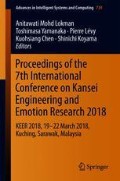Abstract
Words are communication media to share a concept in a community. A word involving ambiguity represents multiple concepts depending on contexts. Such ambiguity causes misunderstanding between people having different contexts. On the other hands, a community uses words to obtain responses from target population, such as customers and participants. The word ambiguity causes misunderstanding between a community and a target population due to different contexts. A community dealing with multiple languages (e.g. multinationals) has a difficulty in translation if there are no words in a second language, all meanings of which do not correspond to all meanings of a word one wishes to translate. To deal with word ambiguity, I proposed a multilingual semantic networks (MLSN) framework. The MLSN is a graph where multiple language words, as nodes, are semantically linked through concepts. I implemented WordNet of English, Japanese, and French into a graph database as a MLSN. I applied MLSN to following two analysis. In the first analysis, I investigated the meanings of ambiguous words such as “kansei”, and their semantic relations with relevant words in the three languages. I found that there are no words corresponding to all meanings of those words in second languages. In the second analysis, I discussed how MLSN supports to select and translate a set of words used as evaluation descriptors. I analyzed ten positive emotion words from Geneva Emotion Wheel and their translation. I demonstrated how MLSN automatically finds translation mismatches and semantic independence between emotion descriptors.
Access this chapter
Tax calculation will be finalised at checkout
Purchases are for personal use only
Preview
Unable to display preview. Download preview PDF.
References
Yanagisawa, H., Nakano, S., Murakami, T.: A Proposal of Kansei Database Framework and Kansei Modelling Methodology for the Delight Design Platform. Journal of Integrated Design and Process Science 1-12 (2016)
Yanagisawa, H.: Kansei quality in product design. Emotional engineering, pp. 289-310. Springer (2011)
De Saussure, F.: Course in general linguistics. Columbia University Press (2011)
Yanagisawa, H., Murakami, T., Noguchi, S., Ohtomi, K., Hosaka, R.: Quantification Method of Diverse Kansei Quality for Emotional Design: Application of Product Sound Design. In: ASME 2007 Design Engineering Technical Conferences and Computers and Information in Engineering Conference. ASME, (2007)
Levy, P.: Beyond kansei engineering: The emancipation of kansei design. International Journal of Design 7, (2013)
Miller, G.A.: WordNet: a lexical database for English. Communications of the ACM 38, 39-41 (1995)
Favart, C., Esquivel Elizondo, D., Gentner, A., Mahut, T.: The Kansei Design Approach at Toyota Motor Europe. In: Fukuda, S. (ed.) Emotional Engineering Volume 4, pp. 119-144. Springer International Publishing, Cham (2016)
Harada, A.: Definition of Kansei, Evaluation of Kansei 2. Report of Modeling the evaluation structure of KANSEI (1998)
Scherer, K.R.: What are emotions? And how can they be measured? Social science information 44, 695-729 (2005)
Fontaine, J.J., Scherer, K.R., Soriano, C.: Components of emotional meaning: A sourcebook. OUP Oxford (2013)
Van de Vijver, F.J.R., Leung, K.: Methods and data analysis for cross-cultural research. Sage (1997)
Author information
Authors and Affiliations
Corresponding author
Editor information
Editors and Affiliations
Rights and permissions
Copyright information
© 2018 Springer Nature Singapore Pte Ltd.
About this paper
Cite this paper
Yanagisawa, H. (2018). Multilingual Semantic Networks for Kansei Study. In: Lokman, A., Yamanaka, T., Lévy, P., Chen, K., Koyama, S. (eds) Proceedings of the 7th International Conference on Kansei Engineering and Emotion Research 2018. KEER 2018. Advances in Intelligent Systems and Computing, vol 739. Springer, Singapore. https://doi.org/10.1007/978-981-10-8612-0_43
Download citation
DOI: https://doi.org/10.1007/978-981-10-8612-0_43
Published:
Publisher Name: Springer, Singapore
Print ISBN: 978-981-10-8611-3
Online ISBN: 978-981-10-8612-0
eBook Packages: EngineeringEngineering (R0)

